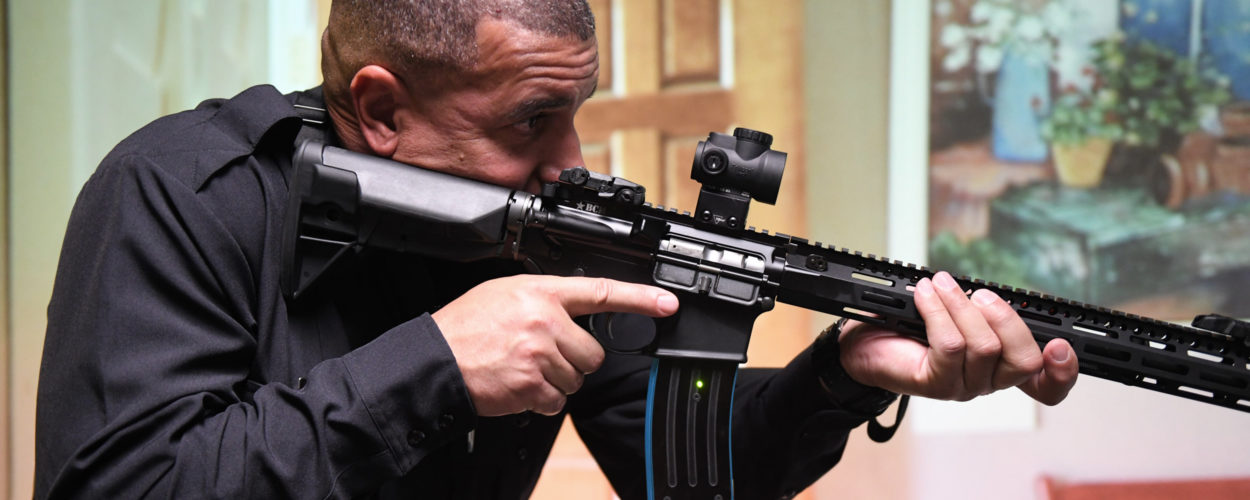
The world is facing difficult and uncertain times as the Novel Coronavirus – COVID-19 – has made its way through 209 countries and territories. With the most common and seemingly effective safety tip being social distancing, many businesses, agencies and operations have shut down in a collective effort to stop the spread of the virus. Unfortunately, members of law enforcement do not have the luxury of being able to stay home and social distance, but continue to put their lives and health on the line to serve their communities.
Conducting any police training is difficult when large groups cannot gather and people are expected to stand at least six feet away from one another. However, VirTra offers a few options to keep your skills sharp in the midst of a worldwide pandemic:
Train in Smaller Groups
While VirTra normally recommends allowing groups of students to watch training drills, especially those inside a simulator, this is no longer an option as it requires numerous people crowding around one area. Instead, change training to two students at a time, who can learn from each other and instructor feedback.
Having students watch other trainees in the simulator is the best way to promote learned behavior, also known as learning through observation. This can still be accomplished if two students participate in training; with one student running through the scenario while the other observes tactics that worked and others to avoid.
Utilize V-VICTA™ Immersive Training Technology
VirTra’s V-VICTA—Virtual Interactive Coursework Training Academy—curriculum includes scenarios, corresponding lesson plans and presentation slides. All material is authored by industry professionals and in-house subject matter experts, designed to save time and money.
Through this curriculum, students can learn skills by reviewing material for courses such as: Active Threat/Active Killer, Weapon Transitions, Tourniquet Application, Contact & Cover Concepts and more are IADLEST certified and POST accepted for CE hours.
Each coursework can be reviewed within the safety of one’s home, excluding the practical application skill tests that are completed in a VirTra simulator. In regards to the application tests, instructors can still give the tests in a similar fashion as described in the section above: training in small groups.
Interleaved & Interwoven Law Enforcement Training
Coursework can be digested over interleaved periods of time, allowing recruits and seasoned officers alike to absorb information that will assist them during complicated encounters in the future. There is not a rule that says a full course should be thrown at a group of students all at once – actually, it is more effective for adult learners to let new information “sink in” over time, giving them the chance to process it.
V-VICTA curriculum is designed be broken down into bite-sized intervals over time. Most modules are scripted to take between 15 and 30 minutes to complete. It is much more beneficial to adult learners to have a constant trickle of information rather than having to digest several hours of it at once.
Some of VirTra’s scenarios take less than 15 minutes to run through. Use this as an opportunity to allow one day for reading a section of the lesson plan or slides, and the next for running through an associated scenario. This way, students can gain information by reading material at home, let it sink in, then practice their skills within the use of force training simulator.
Conduct Range Training in V-Marksmanship
While VirTra’s simulated marksmanship is not designed to replicate live fire training at ranges, the accurate ballistics and customizable weather and light conditions provide the next best option. Running one or two trainees at a time, instructors can run students through target practice in a variety of conditions.
Range training on a simulator is also beneficial because it saves money—something many departments are losing during the COVID-19 outbreak. Agency budgets will notice the difference of not having to spend extra dollars on range and ammo fees, in addition to the gas and paid time transporting individuals. Don’t forget to keep your training equipment clean by wiping it down with a disinfectant wipe in between uses. Avoid spraying chemicals directly onto any of the equipment.
Although it is unclear when the world will return to a state of normalcy, officers must remain well-trained with sharp skills. Canceling training events and letting coursework slip by with no alternative could end up costing your department. Instead, alter training habits to lower the risk of spreading the virus while ensuring all officers are up-to-date on training.
For more advice on how to train in a socially-distanced manner, contact us.
For information on COVID-19, visit the CDC website for guidance and to learn how to protect yourself.
Recently Published
Join Our Newsletter







